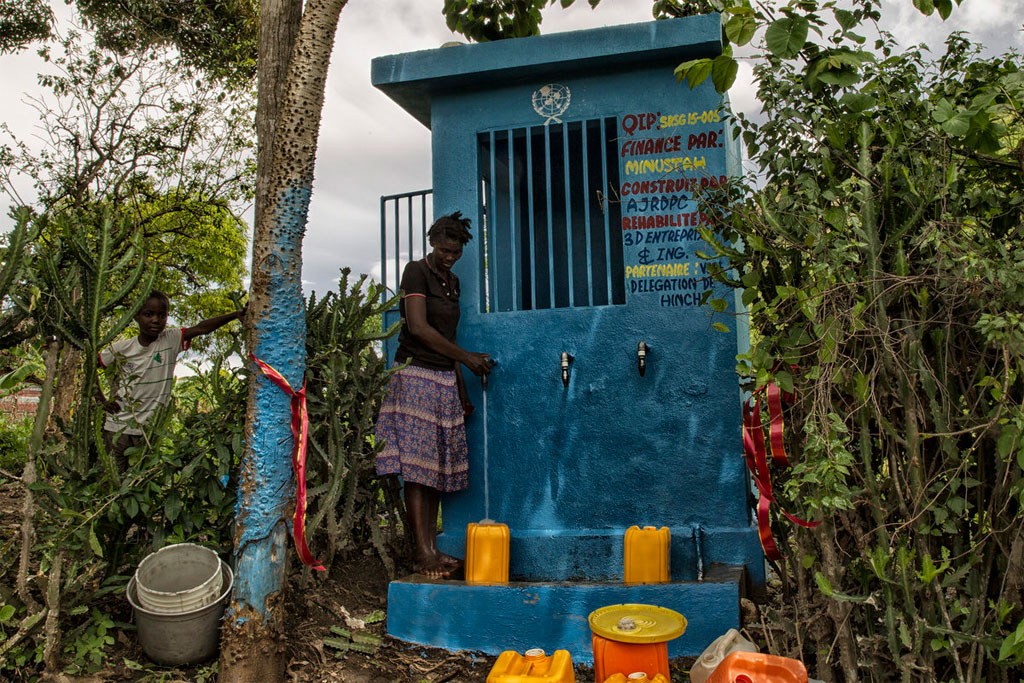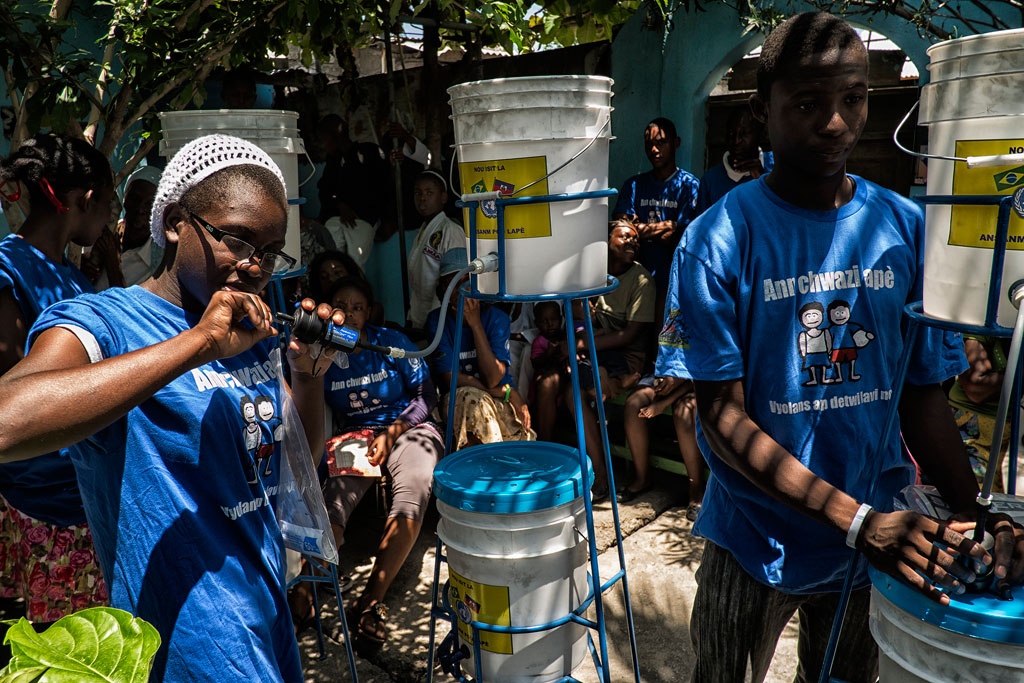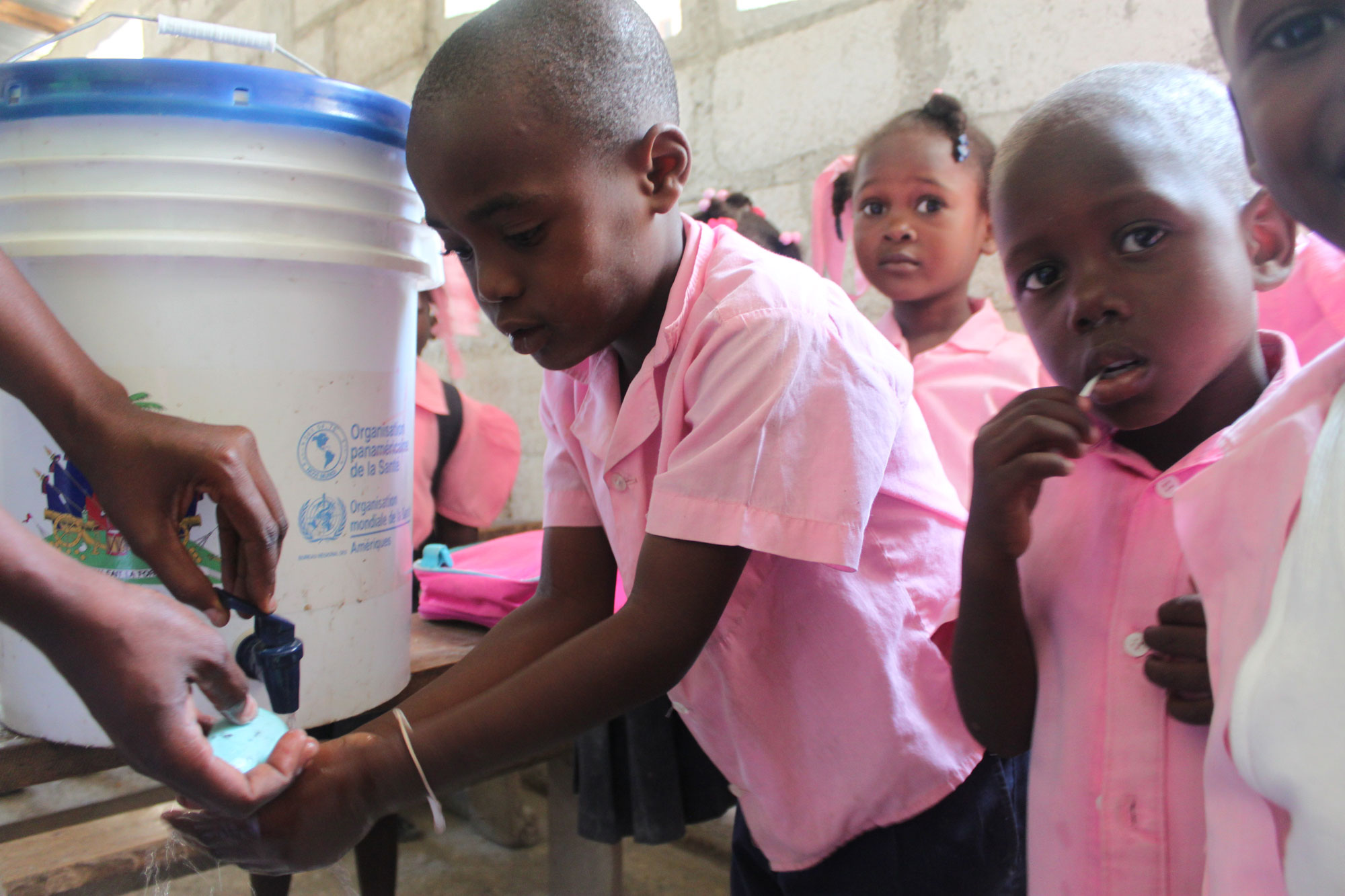INTERVIEW: Funding to prevent cholera is crucial to advance development in Haiti – UNICEF’s Marc Vincent
Earlier today, the spokesperson for United Nations Secretary-General Ban Ki-moon spoke about how the UN system is actively working to develop a package that would provide material assistance and support to those Haitians most directly affected by the outbreak of cholera in the Caribbean nation.
Earlier today, the spokesperson for United Nations Secretary-General Ban Ki-moon spoke about how the UN system is actively working to develop a package that would provide material assistance and support to those Haitians most directly affected by the outbreak of cholera in the Caribbean nation.
“The United Nations also intends to intensify its support to reduce, and ultimately end, the transmission of cholera, improve access to care and treatment and address the longer-term issues of water, sanitation and health systems in Haiti,” the spokesperson added in a statement issued at UN Headquarters in New York.
Following the statement, the UN News Centre spoke with the UN Children’s Fund (UNICEF) Representative for Haiti, Marc Vincent, for an update on the situation on the ground.
UN News Centre: What progress has there been in the fight against cholera in Haiti?
Marc Vincent: In terms of progress, I think we have come a long way and there is still a long way to go. For UNICEF, we are active in about 120 communities and some 20,000 people in the country benefit now from living in an open defecation-free environment. In regard to the rapid response to cholera here, I think the mechanisms put in place have been very successful in controlling the disease and bringing it down from a peak of 350,000 suspected cases in 2011 to 36,000 last year.
Also, for example, when you visit three of the 16 priority communities in the country’s southeast and see how proud they are of having their own toilets, building them themselves, how proud people are of protecting their families and children – when you see that pride it gives you hope; at the personal level, this is the most rewarding experience.

But what we would like to do is totally eliminate cholera. That means we need to continue working on the rapid response mechanisms and we need to ensure that the long-term access to sanitation and water eventually covers all the country. But the National Sanitation is a development program, and it will take time to change behaviour and to ensure universal access. So, in the meantime, we really need to maintain the rapid response mechanisms in place.
UN News Centre: What approaches has the UN taken to respond to the disease?
Marc Vincent: We have approaches based on the short-term, the medium-term and the long-term. The short-term approach is largely an emergency response, supporting a system of rapid response and community based alert. When a cholera case is identified, there is an alert sent out and an emergency rapid response team goes to the particular household affected and sets up a ‘cordon sanitaire’ to decontaminate the surroundings, chlorinate water and advise the family on what preventive steps are needed, as well as to distribute chlorination tablets and rehydration salts. This is linked to other elements of the rapid response, such as coordination among partners in each department and epidemiological analysis, in order to make sure that we are tracking the disease.

The long-term response is to improve access to water and sanitation for all Haitians. At this point, 28 per cent of the population has access to proper sanitation facilities and 58 per cent has access to clean drinking water. What we are trying to do is to increase access to clean water, and to change behaviour in terms of open defecation, which is one of the main sources of contamination in the water system – what happens is that the cholera Vibrio gets spread through water. So, if everyone has a toilet and we can eliminate open defecation, we will go a long way to reducing cholera transmission in the country. Finally, the mid-term response is a combination of efforts to both improve chlorination within urban and rural areas and to improve access to water. In addition, we are in the process of planning a vaccination campaign at a larger level to boost the population´s immunity to the cholera Vibrio.
UN News Centre: What are the so-called WASH interventions and why are they important?
Marc Vincent: WASH stands for water, sanitation and hygiene. But, first of all, we have to look at cholera as one amongst many water-borne diseases. Water-borne diseases, particularly diarrhea, are the second major cause of mortality for children in Haiti. WASH actions are a combination to improve access to clean water and access to sanitation facilities, as well as behaviour change. It takes time to increase people’s awareness of the risks of open defecation.
UN News Centre: The Total Sanitation Campaign was launched some time ago – how is it faring?
Marc Vincent: The campaign was launched by the Prime Minister and Secretary-General Ban Ki-moon in 2014. It targets initially 16 priority communities, identified according to the persistence of cholera. The campaign addresses access to water, rehabilitating water systems and ensuring chlorination to address contamination. At the same time, we are also supporting communities to build toilets and to reduce the contamination of water through open defecation.

What we found is that it is really important that they build them themselves, because then they are more likely to continue using them and they understand their significance. We are also working with schools to improve access to water and sanitation facilities. Children in Haiti are the change agents. When we talk to children in schools and explain to them the challenges of cholera, they go back home and explain it to their parents. Therefore, you create greater awareness. In addition, we are using communication to change behaviour and to make sure that people understand why they need to have toilets, why it is important for their children and how they will save lives.
UN News Centre: What are the links between the rapid response and the longer-term response?
Marc Vincent: We all have to work together to resolve the cholera situation, but also to bring clean water to all children in Haiti. We have excellent partnerships with DINEPA and the Ministry of Health, and we have very good relationships with donors such as the World Bank, the Spanish Agency of Cooperation and the Inter-American Development Bank. Now it is important that we all agree on the priorities and we all target first these 16 priority communities and really ensure good coverage. One case of cholera in Haiti is one too many – one child that dies of cholera is one too many. We really need to eliminate this disease. It is preventable with adequate financing and with a good plan in place we really have a strong case of doing that.
UN News Centre: You mention "adequate financing" - just how important is it for the long-term?
Marc Vincent: One of the challenges that we have is funding the rapid response mechanisms. We need predictable funding. Since humanitarian funding is of a short duration, it is so difficult to know from one year to the next how much money you will be able to plan for. We are hoping to put the rapid response on a longer-term development footing, and then many of these mechanisms can be used, as I said, to prevent water-borne diseases, as well other contagious diseases. Therefore, one of the challenges we have is mobilizing development funds to keep these mechanisms in place and build up the capacity of the Ministry of Health.
UN News Centre: From UNICEF's perspective, investing in water and sanitation to prevent cholera and other water-borne diseases can have knock-on effects in other areas beyond health?
Marc Vincent: Access to water and sanitation affects so many other areas of life – in a child’s life and for Haitian communities in general. If you have clean water then you will reduce the number of water-borne diseases, you will promote good sanitation practices, and you will reduce the school absentee rate. Since 2010 more than 700 children have died of cholera and more than a 100,000 thousand have been affected. If you take four days of school away for every suspected case, we’re talking about hundreds of thousands of lost school days in Haiti. So it has an impact on education, it has an impact on nutrition. There are a large variety of benefits of improving access to clean water and sanitation – basically, it’s crucial for development.
10 facts on cholera



